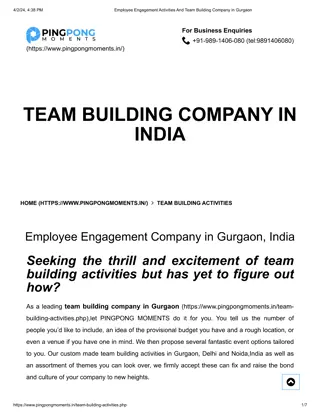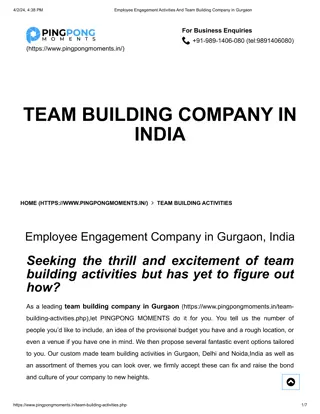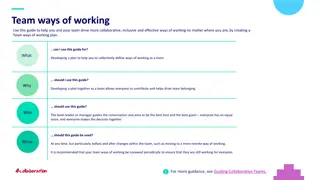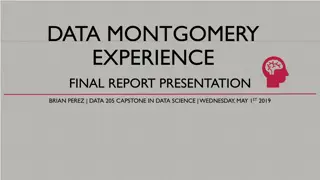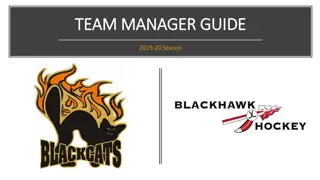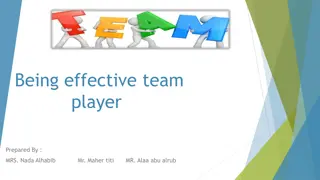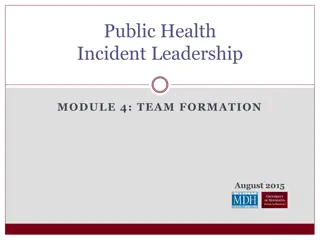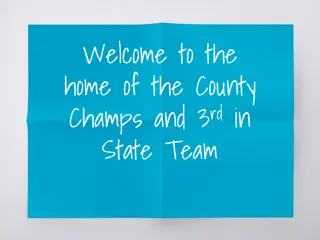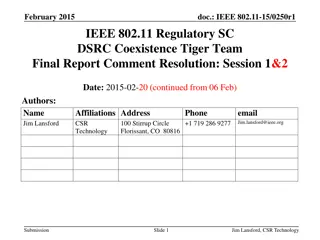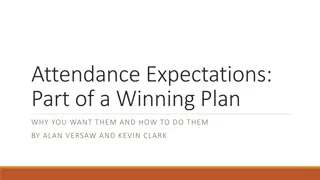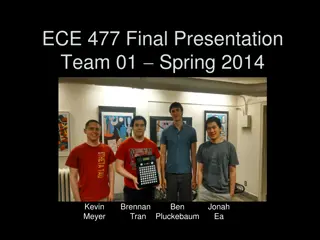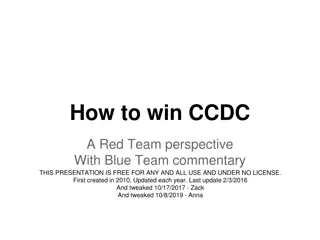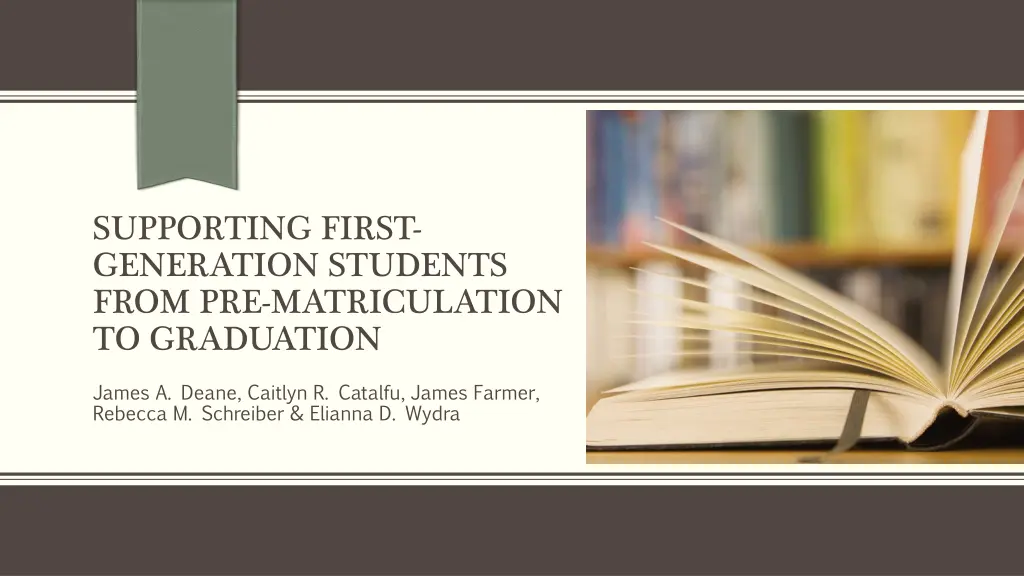
Supporting First-Generation Students in Higher Education
Explore the challenges and strategies for supporting first-generation students in their journey from pre-matriculation to graduation. Learn about key competencies for enrollment managers and academic advisors, as well as employment trends in enrollment management.
Download Presentation

Please find below an Image/Link to download the presentation.
The content on the website is provided AS IS for your information and personal use only. It may not be sold, licensed, or shared on other websites without obtaining consent from the author. If you encounter any issues during the download, it is possible that the publisher has removed the file from their server.
You are allowed to download the files provided on this website for personal or commercial use, subject to the condition that they are used lawfully. All files are the property of their respective owners.
The content on the website is provided AS IS for your information and personal use only. It may not be sold, licensed, or shared on other websites without obtaining consent from the author.
E N D
Presentation Transcript
SUPPORTING FIRST- GENERATION STUDENTS FROM PRE-MATRICULATION TO GRADUATION James A. Deane, Caitlyn R. Catalfu, James Farmer, Rebecca M. Schreiber & Elianna D. Wydra
Research Questions What are the core competencies expected of enrollment managers and academic advisors in four-year public institutions in the United States? How can enrollment managers and academic advisors incorporate these core competencies in supporting first-generation students? What can enrollment managers do to facilitate first-generation students interests and matriculation in public four-year institutions? How can academic advisors or other support personnel, identify and respond to the needs of first- generation students when they arrive on campus and as they progress through their studies?
Background on First-Generation Student Population What is a first-generation student? Typically at a disadvantage with respect to the enrollment process (Pascarella et al., 2004) After matriculating, struggle with campus involvement (Peralta & Klonowski, 2017) College experience differs from that of their peers (Pascarella et al., 2004) Co-curricular experiences strongly correlate to critical thinking gains (Terenzini et al., 1995) At higher risk of degree non-completion in all four years of study Highest danger in year two (Ishanti, 2006; Aug & Ishanti, 2012)
Skills & Competencies Enrollment Management Enrollment Management Academic Advisors Academic Advisors Data retrieved from HigherEdJobs: Administrative Positions, 2020
Employment Trends for Enrollment Management HigherEdJobs HigherEdJobs, 2019 , 2019 BLS, 2019 BLS, 2019 Typical Typical Roles financial financial aid, Roles admissions, admissions, aid, provosts & provosts & deans, deans, marketing marketing Average national Student Admissions Average national Student Admissions Counselor salary: $42,828 Counselor salary: $42,828 Expected Growth Expected Growth - - 7% growth growth 2018 2018 (192,600) 7% (192,600) - - 2028 (206,100) 2028 (206,100) Average national Chief Student Average national Chief Student Admissions Officer salary: $95,664 Admissions Officer salary: $95,664 Median salary Median salary - - $94,340 per year or $94,340 per year or $45.36 $45.36 per per hour hour Typical Level of Education Typical Level of Education - - Master's degree degree (AACRAO, 2019) Master's AACRAO, 2019). .
Support Techniques for Enrollment Managers Unfamiliar Unfamiliar (Perna & Jones, 2013) Meet Meet (Bryan, Moore-Thomas, Day- Vines, & Holcomb-McCoy, 2011) Encourage Encourage ( (Terenzini, Springer, Yaeger, Pascarella, & Nora, 1996) Connect Connect ("First-Generation Students", n.d.) " careful around identity careful around identity" "understand people understand people"
Employment Trends for Academic Advisors BLS, 2019 BLS, 2019 HigherEdJobs HigherEdJobs, 2019 , 2019 Typical Typical Roles & residential life, multicultural affairs & residential life, multicultural affairs Roles Student affairs, housing Student affairs, housing Average national Academic Advisor Average national Academic Advisor salary: salary: $45,979 $45,979 Expected Growth Expected Growth - - 7% growth 2018 2018 (192,600) (192,600) - - 2028 (206,100) 7% growth 2028 (206,100) Average national Chief Campus Average national Chief Campus Academic Advising Academic Advising Administrator salary: salary: $77,113 $77,113 Administrator Median salary Median salary - - $94,340 per year or $94,340 per year or $45.36 per $45.36 per hour hour Typical Level of Education Typical Level of Education - - Master's degree degree Master's
Support Techniques for Academic Advisors "Questions of Questions of how, al., 2018). how," (Glaessgen et "Organizational strategies Organizational strategies," (Lombardi et al., 2012). "Living Learning Community Living Learning Community," (Jarzombek et al., 2017). Individualized approach, Individualized approach, (Bassett, B. S., 2019). "Not a one Not a one- -size size- -fits all..." fits all..."
Conclusions & Recommendations Definition Competencies Suggested Strategies Employment Trends Professional Development
References American Association of Collegiate Registrars and Admissions Officers (AACRAO). (2019, August). U.S. chief admissions officer career profile survey. https://www.aacrao.org/docs/default-source/research-docs/career-profile/2019-chief- admissions-officer-report.pdf Aug, N., & Ishitani, T. T. (2012). A longitudinal approach to assessing attrition behavior among first-generation students: Time-varying effects of pre-college characteristics. Research in Higher Education, 44(4), 433 449. Bassett, B. S. (2019). Better positioned to teach the rules than to change them: University actors in two low-income, first-generation student support programs. The Journal of Higher Education, 91(3), 353 377. doi: 10.1080/00221546.2019.1647581 Bryan, J., Moore-Thomas, C., Day-Vines, N. L., & Holcomb-McCoy, C. (2011). School counselors as social capital: The effects of high school college counseling on college application rates. Journal of Counseling & Development, 89, 190 199. https://doi.org/10.1002/j.1556-6678.2011.tb00077.x Bureau of Labor Statistics (BLS). (2019, September 4). Occupational outlook handbook, postsecondary education administrators. U.S. Department of Labor. March 31, 2020, from https://www.bls.gov/ooh/management/postsecondary-education-administrators.htm Defining First-generation. (n.d.). Retrieved from https://firstgen.naspa.org/blog/defining-first-generation
References (continued) First-Generation Students. (n.d.). Retrieved from https://professionals.collegeboard.org/guidance/prepare/first- generation Glaessgen, T.A., MacGregor, C.J., Cornelius-White, J.H.D., Hornberger, R.S., & Baumann, D.M. (2018). First-generation students with undecided majors: A qualitative study of university reacculturation. NACADA Journal, 38(1), 22- 35. https://doi.org/10.12930/NACADA-16-030 HigherEdJobs: Administrative Positions. (2020). Retrieved from https://www.higheredjobs.com/admin/ HigherEdJobs. (2020). Executive- level administrator salaries. https://www.higheredjobs.com/salary/salaryDisplay.cfm?SurveyID=48 HigherEdJobs. (2020). Professional salaries. https://www.higheredjobs.com/salary/salaryDisplay.cfm?SurveyID=49 Ishitani, T. T. (2006). Studying attrition and degree completion behavior among first-generation college students in the United States. Journal of Higher Education, 77(5), 861 885. https://doi.org/10.1353/jhe.2006.0042 Jarzombek, M.J., McCuistion, K.J., Bain, S.F., Guerrero, D., & Wester, D.B. (2017). The effect of an honors college on retention among first year students. Research in Higher Education Journal, 33(1), 1- 16. https://eric.ed.gov/?id=EJ1161500
References (continued) Lombardi, A.R., Murray, C., & Gerdes, H. (2012). Academic performance of first-generation college students with disabilities. Journal of College Student Development, 53(6), 811-826. https://doi.org/10.1353/csd.2012.0082 Pascarella, E. T., Pierson, C. T., Wolniak, G. C., & Terenzini, P. T. (2004). First-generation college students : Additional evidence on college experiences and outcomes. The Journal of Higher Education, 75(3), 249 284. Perna, L.W. & Jones, A. (2013). The state of college access and completion. Routledge. Peralta, K.J. & Klonowski, M (2017). Examining conceptual and operational definitions of "First-generation college student" in research on retention. Journal of College Student Development, 58(4), 630-636 RTI International. (2019). Use of student services among freshmen first-generation college students. Retrieved from https://firstgen.naspa.org/files/dmfile/NASPA_FactSheet-03_FIN.pdf Terenzini, P.T., Springer, L. Pascarella, E.T., and Nora, A. (1995). Influences affecting the development of students critical thinking skills.Research in Higher Education, 36(1), 23 39. Terenzini, P. T., Springer, L., Yaeger, P. M., Pascarella, E. T., & Nora, A. (1996). First generation college students: characteristics, experiences, and cognitive development. Research in Higher Education 37(1), 1-22.


